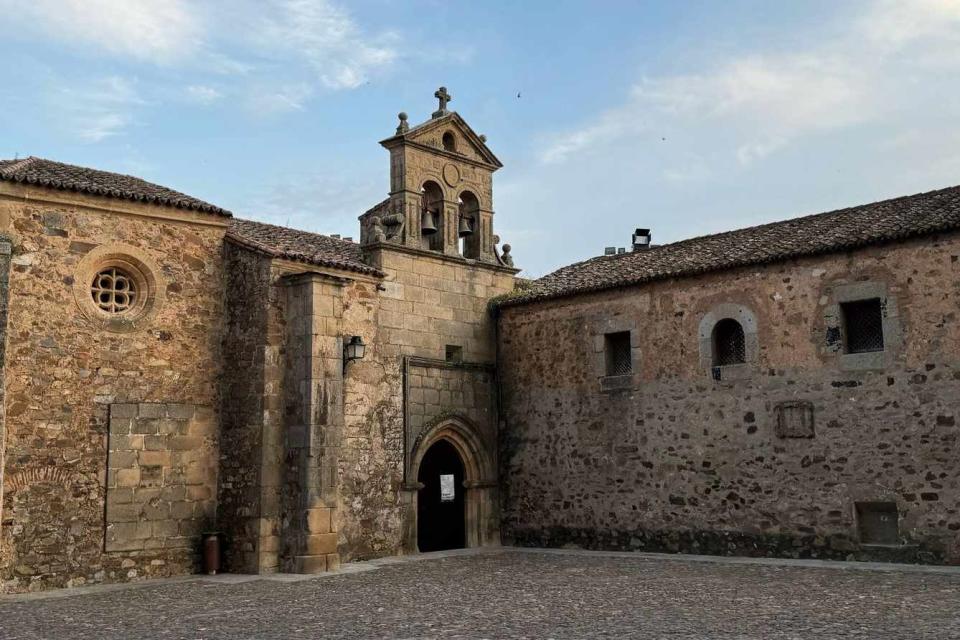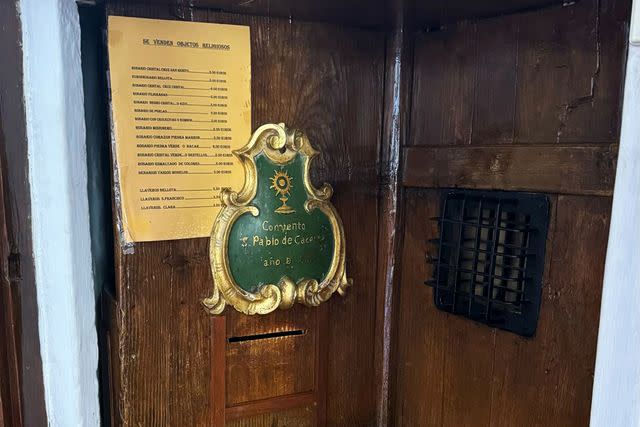Cloistered Nuns Are Selling Cookies Through Convent Windows in This Medieval City in Spain
Italy may have wine windows, but cloistered nuns have a sweeter surprise in Cáceres.

Carrie Honaker
In Cáceres, Spain, the fairytale city where much of House of Dragons was filmed, a sweet secret lies behind the hidden windows of three convents. Inside, cloistered nuns make cookies and sell them to the public using a bell, a lazy susan, and phrases spoken through a cloaked window.
Marco Mangut, a native of Cáceres, visited these convents as a child with his father. The nuns make muffins, tocinitos de cielo (a dairy-free flan-like dessert), mantecados (shortbread cookies), and a few styles of sweets. He loves the perrunillas made with a secret recipe by the nuns at the Convento de San Pablo. The sandy but crunchy texture that melts quickly in the mouth is reminiscent of shortbread and emblematic of the Extremaduran region of Spain.
Following in his father's footsteps, Mangut leads private tours through the medieval cities in Extremadura. “I remember when I was a little boy walking with my father and his groups around the old town and stopping by the convents to buy cookies from the nuns — this was a usual activity for us locals and is something in my earliest memories,” Mangut said.

Carrie Honaker
At the Convento de San Pablo, the highest point in the city, a simple sign reading “Se Venden Dulces Artesanos” (roughly translated as Sale of Sweets) sits adjacent to an intercom button. We press the button and say the phrase, “Ave María Purísima” (Holy Mary, most pure), a nun responds “Sin pecado concebida” (conceived without sin), and a door opens to a shadowed portico where a list of Extremaduran sweets prepared by hand by the cloistered nuns sits next to an antique wooden turnstile. We order through the second intercom and place euros on the lazy susan, which rotates until the cookies arrive.
Mangut shed some light on the history of these local sweets. “This convent was built in the 15th century and housed the unmarried girls of noble families forced to become nuns. They became Poor Clare nuns and made vows to live cloistered. There's always somebody in charge of buying the groceries to make their sweets and bringing them to the convent. When the nuns receive them there are two doors: one opens to the street, the other to the convent. This way nobody sees or interacts with them and they maintain their vows. All of their recipes have been handed down from generation to generation through the centuries,” he said.
Poor Clare nuns — members of the Roman Catholic Franciscan Order of St. Clare, a religious order founded by St. Clare of Assisi in 1212 — embrace lives of poverty, chastity, and obedience, and remain sequestered from the public view. They provide for themselves by the work of their hands (like cookie sales) and through alms of the faithful.
A few of these cookie-selling convents operate throughout Spain, and three sell their wares in Cáceres alongside restaurants recommended in the Michelin Guide, like two-Michelin-starred Atrio, the site of an elaborate $1.7 million wine heist by a Mexican beauty queen and Romanian national, a host of paradores (Renaissance castles, monasteries, convents, and palaces transformed into luxury hotels), and modern museums like the Art Helga de Alvear. The Monasterio de Santa María de Jesús and the Convento Jerónimas join the secret cookie window industry, but Mangut stays faithful to the Convento de San Pablo and their tightly guarded recipes.
After you’ve rubbed the feet of San Pedro de Alcántara in the heart of the medieval city center, which are worn from rubbing them for luck in love (Mangut swears by it), climb the steps to the highest point in the city, find the secret cookie window, and indulge in this local Extremaduran tradition. Cash is still king and exact change is appreciated.
For more Food & Wine news, make sure to sign up for our newsletter!
Read the original article on Food & Wine.

